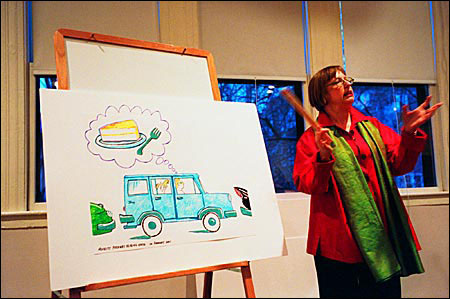Radcliffe novelist reads, shares insights into writing
At Radcliffe reading, Glass invites audience into the creative process

For her Radcliffe Fellowship presentation last month (Jan. 12), novelist Julia Glass strayed from the expected reading of a work-in-progress followed by questions for a format she thought more appropriate to an audience of curious Radcliffe colleagues. With witty insights and foam-core illustrations – a sort of pauper’s PowerPoint – she invited the audience into her creative process as well as the novel she’s been working on this year, “Piece of Cake.”
Glass’ inspiration for “Piece of Cake,” she said, came in a traffic jam heading north on the Merritt Parkway in February 2001 when she was overcome by a craving for coconut cake.
“I thought, I want to write a novel that starts because somebody eats a really fabulous piece of cake,” she said, a novel that evolves as the cake causes a domino effect.
Although she describes her work as plot-driven, Glass (whose first novel, “Three Junes,” won the 2002 National Book Award in Fiction) admitted her fascination with the psychology of her characters.
“The stories are not the ends but the means … the tools I use to dig down into the psyche,” she said. “Why do people make the emotional choices they do in their lives? What happens when love and responsibility clash with desire?”
“Piece of Cake,” Glass’ second novel, centers on Greenie, a pastry chef in Greenwich Village, which also happens to be Glass’ home turf. Pointing to a poster board family tree tangled with sticks and branches, Glass illustrated Greenie’s connections to the three other main characters of the story: her husband, Alan, as depressed as Greenie is sunny; Walter, owner of a restaurant serving “Eisenhower-era food”; and Saga, a rescuer of stray animals whom Alan encounters on the street.
Describing her characters, Glass likened fiction writing to “a child’s version of voodoo. We’re getting imaginary people in trouble and causing them pain.”
“Piece of Cake” shifts its points of view among these four main characters. Reading from two chapters, Glass showcased her talent for simultaneously driving plot forward and creating richly realized characters.
Chapter 1, in Greenie’s voice, opens with the line, “The call came on Sadie Hawkins Day” and closes with a southern accent on the other end of the phone requesting, “Please hold for the governor of New Mexico.”
In the pages in between, however, Glass abandons the phone to illustrate Greenie largely through the people and places that surround her. Readers meet Alan, her psychologist husband who is losing clients as fast as Greenie is gaining them but nonetheless derides her baking as not “a business with a capital B.”
“Alan was a man, who … when caught in the balance, always tipped toward depression,” Glass writes.
Walter is the client-turned-friend for whose restaurant, Walter’s Place, Greenie bakes “portly, solid citizenry desserts.”
Glass also takes us to Greenie’s kitchen, in the basement of a tenement building where windows give “a rabbit’s-eye view” of ankles and dogs. There, Greenie sings along to Dinah Washington, Nina Simone, Aretha Franklin, and musical soundtracks. “Not even Alan knew about her secret Broadway habit,” writes Glass.
Reading from the fifth chapter, Glass introduces Saga’s point of view. A 33-year-old animal lover of mediocre intellect even before she suffered a head injury, Saga lives with her beloved Uncle Marsden, a retired Yale professor still known as “the legendary snail guy.” Her cousins, disdainful of the labels Saga has put on all the kitchen cabinets to remind her where to return dishes and spoons, wonder who will take care of Saga when her uncle dies.
Glass, who fielded audience questions about creating dialogue and voice, naming her characters, and letting them go when she finished a novel (it’s like sending children off to college, she said), also shared a central paradox of writing fiction that came to her over lunch with some Radcliffe colleagues.
She’s always considered “make it real” a prime commandment of fiction. “That’s the absurdity of the business of a novelist,” Glass said. “We’re creating a complex set of patent falsehoods … yet we work tremendously hard to make them come true.”




